Filter by
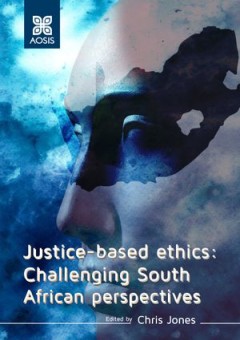
Justice-based ethics
The book reflects academically on important and relevant ethical fields from a multidimensional South African context. The book challenges conventional borders from different ethical, theological, philosophical, economic and cultural perspectives with insight and expertise and seeks to add academic-ethical value, locally and globally, with its different points of departure deeply embedded in ju…
- Edition
- -
- ISBN/ISSN
- 9781928396710
- Collation
- -
- Series Title
- -
- Call Number
- -
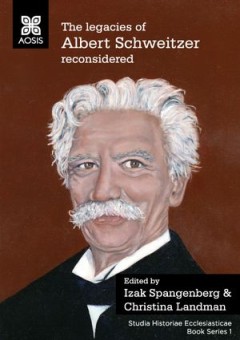
The legacies of Albert Schweitzer reconsidered
This book on the legacy of Albert Schweitzer contextualises this remarkable intellectualist, humanist, medicine-man, theologian and Nobel Prize winner. This collected work is aimed at specialists in the humanities, social sciences, education, and religious studies. The authors embrace philanthropic values to benefit Africa and the world at large. The publication engages with peers on the releva…
- Edition
- -
- ISBN/ISSN
- 9781928396031
- Collation
- -
- Series Title
- -
- Call Number
- -
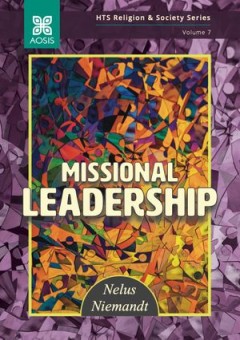
Missional Leadership
The purpose and aim of this book is to develop an appropriate leadership model for missional churches. This implies a positioning of this book within the broader theology of mission and a consensus on the theology of the Missio Dei, originating at the 1952 conference of the International Missionary Council in Willingen, Germany. In this approach to the theology of mission, mission is understood…
- Edition
- -
- ISBN/ISSN
- 9781928523062
- Collation
- -
- Series Title
- -
- Call Number
- -

Nicholas Bhekinkosi Hepworth Bhengu’s Lasting Legacy
This is a scholarly book that commemorates the legacy of Rev. Nicholas Bhekinkosi Hepworth Bhengu who was born on 05 September 1909 at eNtumeni, KwaZulu-Natal, South Africa. He was the founder of the Back to God Crusade in the 1950s that has become institutionalised within the Assemblies of God. He taught his church to be self-sustaining and also encouraged material independence through hard wo…
- Edition
- -
- ISBN/ISSN
- 9781928396581
- Collation
- -
- Series Title
- -
- Call Number
- -
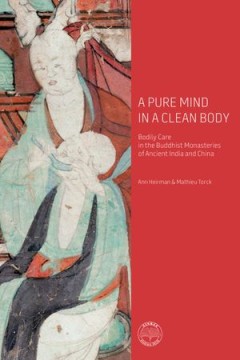
A Pure Mind in a Clean Body Bodily Care in the Buddhist Monasteries of Ancie…
Buddhist monasteries, in both Ancient India and China, have played a crucial social role, for religious as well as for lay people. They rightfully attract the attention of many scholars, discussing historical backgrounds, institutional networks, or influential masters. Still, some aspects of monastic life have not yet received the attention they deserve. This book therefore aims to study some o…
- Edition
- -
- ISBN/ISSN
- 9789038220147
- Collation
- -
- Series Title
- -
- Call Number
- -
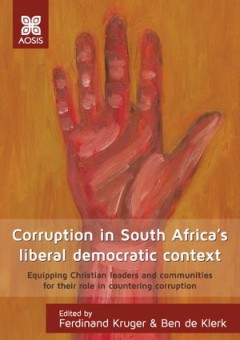
Corruption in South Africa's liberal democratic context Corruption in South…
This book is meant for academics in the fields of theology and ecclesial management, for business leaders and governmental authorities in the private and public domain. This collected work by mainly practical theologians reflects on the phenomenon of corruption in the liberal democracy of post-apartheid South Africa. Liberal democracy has considerable salience in the contemporary world. Not onl…
- Edition
- -
- ISBN/ISSN
- 9780620725262
- Collation
- -
- Series Title
- -
- Call Number
- -
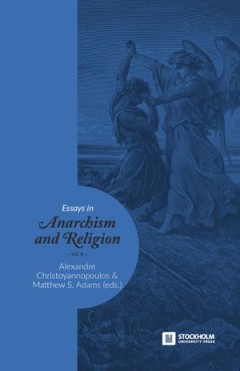
Essays in Anarchism and Religion: Volume 1
"Anarchism and religion have historically had an uneasy relationship. Indeed, representatives of both sides have regularly insisted on the fundamental incompatibility of anarchist and religious ideas and practices. Yet, ever since the emergence of anarchism as an intellectual and political movement, a considerable number of religious anarchists have insisted that their religious tradition neces…
- Edition
- -
- ISBN/ISSN
- 9789176350430
- Collation
- -
- Series Title
- -
- Call Number
- -
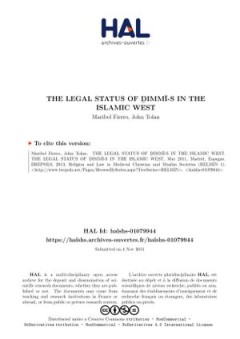
The Legal status of ḏimmī-s in the Islamic West
The first monograph devoted to the legal status of religious minorities status accorded to dimmī-s ( Jews and Christians) in the Muslim law in the medieval Muslim west (the Maghreb and Muslim Spain). The articles in this volume provide numerous examples of the richness and complexity of interreligious relations in Medieval Islam and the reactions of jurists to those relations. The studies brou…
- Edition
- -
- ISBN/ISSN
- 9782503548548
- Collation
- -
- Series Title
- -
- Call Number
- -

Religious Minorities in Christian, Jewish and Muslim Law (5th - 15th centuries)
The fruit of a sustained and close collaboration between historians, linguists and jurists working on the Christian, Muslim and Jewish societies of the Middle Ages, this book explores the theme of religious coexistence (and the problems it poses) from a resolutely comparative perspective. The authors concentrate on a key aspect of this coexistence: the legal status attributed to Jews and Muslim…
- Edition
- -
- ISBN/ISSN
- 9782503565712
- Collation
- -
- Series Title
- -
- Call Number
- -

Religious minorities, integration and the State / État, minorités religieus…
Judaism, Christianity and Islam have coexisted in Europe for over 1300 years. The three monotheistic faiths differ in demography, in the moment of their arrival on the continent and in the unequal relations they maintain with power: Christianity was chosen by a large number of inhabitants and became — in spite of important differences according to place and time —a religion of state. The or…
- Edition
- -
- ISBN/ISSN
- 9782503564999
- Collation
- -
- Series Title
- -
- Call Number
- -
 Computer Science, Information & General Works
Computer Science, Information & General Works  Philosophy & Psychology
Philosophy & Psychology  Religion
Religion  Social Sciences
Social Sciences  Language
Language  Pure Science
Pure Science  Applied Sciences
Applied Sciences  Art & Recreation
Art & Recreation  Literature
Literature  History & Geography
History & Geography